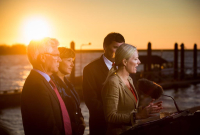Support strong Canadian climate journalism for 2025
Editor's note: This is one of four opinion pieces published today on the proposed Kinder Morgan pipeline. For the complete selection of pieces, go here.
For me, engagement is about going into a conversation with an open mind and a genuine interest in what the other person has to say. It means listening to every question, concern and idea in order to understand another point of view, consider new ideas and ultimately, build a long-term relationship based on respect and trust.
Successful engagement isn’t about finding agreement on every issue or changing someone’s opinion. It’s about honesty, openness and a willingness to listen and learn. It’s this approach that has made our project stronger and has laid the foundation for us to build and operate the expanded pipeline in consideration of the many and varied interests we have heard.
In addition to our commitments, the National Energy Board’s recommendation to the federal government to approve the expansion project is subject to 157 conditions. Many of these conditions are in response to community and Intervenor feedback gathered through the review process and from the many residents who participated in our open houses, workshops and online opportunities. As a result of these conversations, we’ve improved and optimized our planning and mitigation measures to address concerns about our pipeline operations, emergency response and tanker safety.
We share the value Canadians place on the environment and we clearly understand the concerns raised about increases in tanker traffic, safety and emergency response. While the existing safety regime already meets global standards, we’ve proposed additional measures to further improve safety for the entire marine shipping industry - because spill response is about ferries, cruise and cargo ships, and all the vessels using our waterways.
If our project proceeds, there will be an investment of more than $150 million in marine spill response, including a new 24/7 spill response base in Vancouver Harbour. Overall, the investment will fund five new response bases, about 115 new employees and approximately 26 new vessels. This will double the spill response capabilities and cut mandated response times in half. And, the tug escort regime will be expanded to cover the entire tanker route – from our marine terminal, through the Strait of Georgia and the Strait of Juan de Fuca.

We’re committed to building long-term relationships with Aboriginal communities. To date, close to 40 Aboriginal groups located along the pipeline and marine corridor in Alberta and British Columbia have provided written letters of support for the Project. We are engaging with communities along our pipeline and the marine shipping corridor to ensure they see benefits to local community programs and infrastructure, including education, environmental conservation and improved local emergency response capacity.
We’ve demonstrated the demand for much-needed access to global markets and how building this pipeline will bring both dollars and many thousands of jobs for communities in BC and Alberta at a time when our economy needs it most. However, these benefits will not come at the expense of the environment or safety.
Our team is committed to earning your trust and confidence, and we know there’s still more work to do. I encourage you to reach out and provide us with your feedback, opinions and concerns. We want to hear from you. Whether you agree with the Project or not, we’re committed to continuing to work with stakeholders, communities and Aboriginal groups to support collaborative efforts to enhance safety, protect our environment and build a better project.
Lizette Parsons Bell is the lead for stakeholder engagement and communications at Kinder Morgan for its Trans Mountain Expansion Project.







Comments
Sorry, I have to call b.s. on this. You can't pretend to care about the environment when you are lobbying to build a pipeline through protected wilderness and over pristine waterways. Changing the way ferries and cruise ships operate has no relevance to the fact that you are twisting many arms to fill one if the cleanest and most beautiful areas remaining with tankers. Promising to create a spill response team of 115 people is like the story of the Little Dutch Boy with his finger in the dike trying to stop the flood. A spill would be inevitable and that number of responders woefully inadequate. It would only take one spill to destroy precious habitat for salmon or irreplaceable wilderness. Dolphins, several whale species and other endangered or at risk critters would be imperilled by the increase in noise, propellor strikes, increased traffic and risk of spill. If Corexit was sprayed on an ocean spill, the resulting toxic soup would end shellfish, crustaceans, much of the fish and all seaweed. Look at Louisiana and the Gulf of Mexico today for our future - fishing industry wiped out, huge unemployment and poverty. Most never got a dime of the promised BP settlement money either.
All the secret meetings and back room deals in the world won't get public support for this crime against nature, so get used to disappointment.
Engagement as stated, "...genuine interest in what the other person has to say..." is merely lip service paid by pipeline companies to landowners and others, and it's generally LIES.
Until there is an honest, transparent, arms length process to review applications, and until the Environmental Assessment Act has been amended (TRULY considering the environment), no pipeline review is valid. The NEB is a sham.
I have some questions not addressed in your article. I believe they have been raised many times by many people, but we are still waiting to hear what your company has to say about them:
1) What about the guaranteed spill of the five billion tonnes of climate pollution this project allows to come out of the ground? Does the company take any responsibility for enabling and profiting off of this?
2) What about the $450 billion in economic damages this climate pollution will cause? That's according to the US Government's Social Cost of Carbon estimates for "economic damages associated with carbon dioxide emissions." This averages $53 per barrel over the lifespan of your project. Is KinderMorgan going to take any share of the responsibility for the damage you are enabling and profiting from?
3) With the Paris Agreement the world has agreed to sharply reduce the amount of fossil carbon coming out of the ground each year until it is zero. The reason is to protect our children and future generations from serious harm. How is your company acting in the spirit of this critical agreement? Is tripling the carbon you will carry with TMX part of the solution? Are you reducing the amount of fossil carbon that flows through your business plans?
I would appreciate hearing your answers to these questions.
The Ditch Foreman in charge of the Side booms in the first picture supplied by Kinder Morgan should have been fired. Note the side boom in the left of the picture has its boom against a section of pipe which should have been moved out of the way. The load hook is also NOT straight up and down vertically which could cause that machine to topple over, or workers in the trench to be crushed. Craning policy is that the load line and hook be always vertical. This is a disaster in the making. A friend on a ditch crew was trapped against a pipeline trench wall by the pipe being lowered improperly because of this type of gong show. It took 6 hours to free him from being crushed to death. These side booms are archaic equipment from the 1950's.
The operators have no cab to protect them from cable failure and the elements, note the protective umbrella on the middle machine. It is normal to work 12 hour shifts on pipelines when long shifts make for fatigue and accidents. There is also no rollover protection nor 4 point safety harnesses for the operators. It appears the side boom operator on the right is giving directions when by Ontario Ministry of Labour rulings he is to be taking directions from a knowledgeable and trained signalman. It also appears that his right track maybe off the ground because he has too much strain on the load. It is quite obvious the Ditch Foreman was inexperienced endangering his workers.
Provincial Labour inspectors should be ashamed of themselves for allowing this type of archaic equipment in this day and age. They should be using Conventional cranes on tracks with hydraulic extendable rear counter weights with telescopic load booms so the line and hook are always vertical.